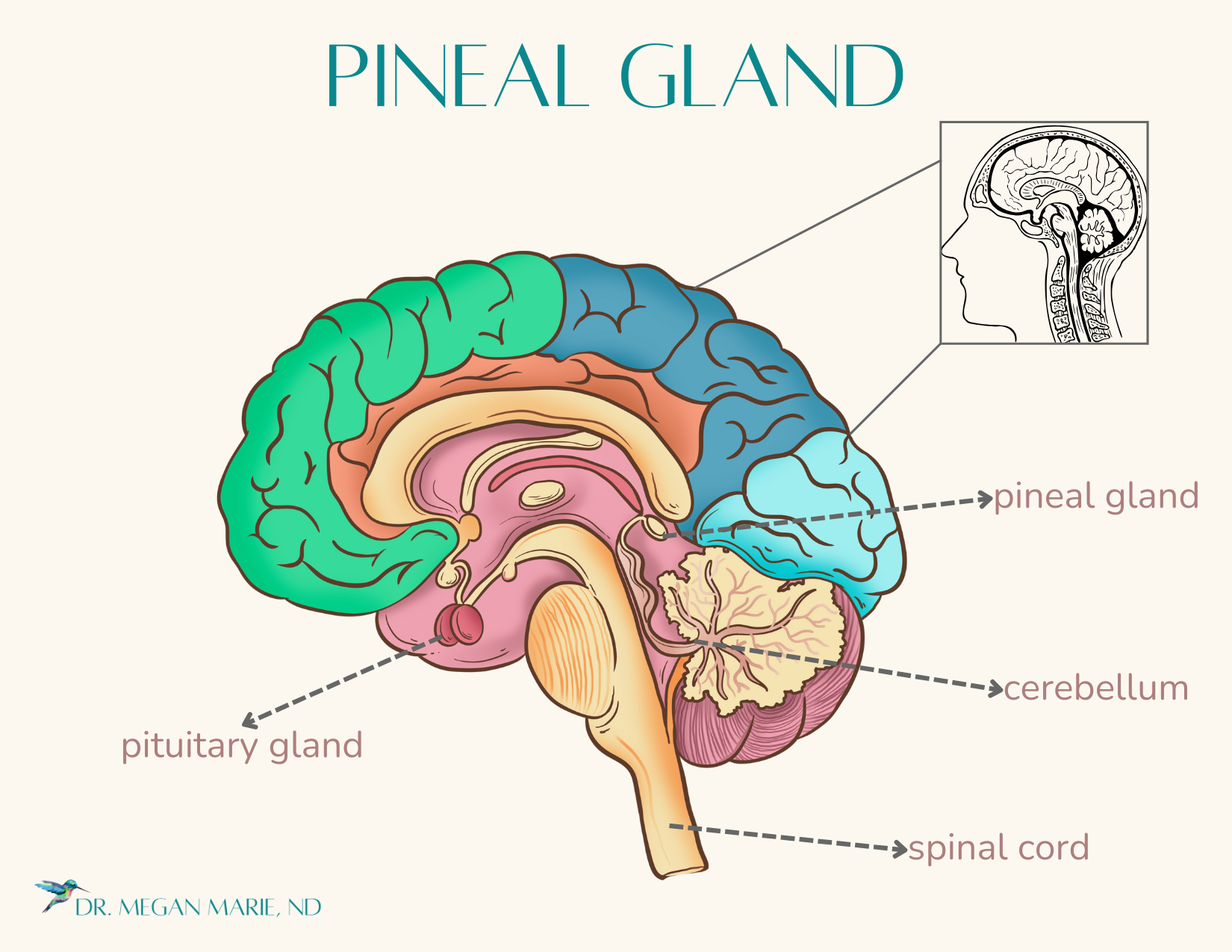Pineal Gland: The Sleeper & Healer
Welcome back to our Tour of the Body series! This week, we’re exploring a tiny but mighty gland tucked deep within the brain: the pineal gland. Interestingly, the pineal gland was the last part of the endocrine system to be discovered, and researchers are still uncovering its full range of functions. What we do know is it secretes melatonin, a hormone that regulates your sleep-wake cycle.
DAY-NIGHT BALANCE
During the day, the pineal gland is relatively inactive. But as the sun sets and darkness falls, it starts to produce melatonin, signaling to your body that it’s time to wind down. This process is directly influenced by light exposure, which is why our modern lifestyle with artificial lighting and screen time can often disrupt the pineal gland's natural rhythm.
MELATONIN & SLEEP
Melatonin primarily helps us fall asleep, rather than stay asleep. Instead, its main role is to regulate your circadian rhythm—the internal clock that prepares your body for rest.
Recent research reveals that melatonin production is controlled by darkness, not sleep itself. So even if you’re lying awake, as long as you’re in a dark environment, your pineal gland will keep producing melatonin. Levels rise in the evening, peak in the middle of the night, and then taper off as morning light increases—giving way to cortisol, the hormone that wakes you up.
MELATONIN & BRAIN HEALTH: THE GLYMPHATIC SYSTEM
Melatonin is not just a sleep aid—it’s a powerful antioxidant, especially for the brain. One of its key roles is in the brain's glymphatic system, a fluid transport network that clears out waste and toxins like amyloid-beta (Aβ), a substance linked to Alzheimer’s disease. In other words, it's like your brain's "wash cycle."
The pineal gland releases melatonin into the brain, where it enhances the glymphatic system’s function, particularly during sleep. Think of melatonin like the detergent you add to the dishwasher—it helps your brain do a deep clean while you rest.
THE PINEAL GLAND & AGING
As we age, melatonin production naturally declines, which can slow down glymphatic function and lead to the accumulation of harmful substances in the brain.
On top of that, the pineal gland tends to calcify over time—this means calcium deposits build up in the gland. While some calcification is normal, excessive amounts can reduce its function. Studies show that those with Alzheimer’s disease often have higher levels of pineal calcification, underlining the importance of protecting this little gland.
FOLKLORE VS. REALITY: THE THIRD EYE
Throughout history, the pineal gland has been linked to mystical ideas like the "third eye." While the third eye symbolizes intuition and spiritual insight, it’s not physically connected to the pineal gland. The third eye is more of a metaphor for higher awareness. Remember: your whole being is the gateway to heightened intuition—it’s not dependent on any one gland.
FUN FACT: MELATONIN BEYOND THE PINEAL GLAND
Here’s a little-known fact: the pineal gland is not the only source of melatonin. Other tissues—like the gut, lungs, immune cells, and even skin—can produce melatonin independently. This supports the idea that melatonin isn’t just a sleep hormone; it's also a natural adaptogen, helping the body adjust to stress and regulate various systems.
BEYOND SLEEP: A HORMONAL BALANCER
The pineal gland doesn’t just regulate sleep. It also influences mood, energy, and reproductive hormones. By balancing melatonin levels, it helps fine-tune your body’s internal environment, quietly working to support your overall well-being.
CARING FOR YOUR PINEAL GLAND
To keep your pineal gland functioning at its best:
Prioritize Sleep Hygiene: Avoid bright screens before bed and create a dark sleep environment.
Get Natural Sunlight: Exposure to daylight during the day helps reset your circadian rhythm.
Manage Stress: Excessive stress can throw off your hormonal balance, including melatonin production.
Eat a Mediterranean diet: There is countless research highlighting the benefits of eating whole foods that reduce inflammation, and support our body’s natural health.
The pineal gland may be small, but its impact is huge! By supporting your body’s natural sleep-wake cycles, you can improve your sleep, brain health, and overall wellness. Stay tuned for next week’s post as we continue our journey through the body’s fascinating systems!




